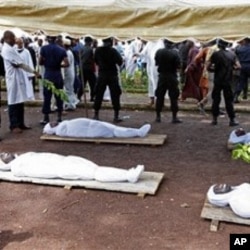Guinea's injured military leader is calling on his supporters to back plans for a transitional government.
In his first public comments since being shot in the head six weeks ago, Captain Moussa Dadis Camara called for calm and national unity in the pursuit of a transitional government and democratic elections in June.
Captain Camara says ethnic prejudices in human relations and politics are detrimental to building democracy. He says he fully supports plans for a transitional government announced last week by acting leader Defense Minister Sekouba Konate.
Key parts of that plan - including foreign military observers and a ban on soldiers running for office - have previously been rejected by Captain Camara's allies, leading some to suggest that he has been forced into this plan, in part, because of his poor health.
Captain Camara says the plan announced last week was not imposed on him or on the people of Guinea and offers a quick way out of the political crisis that began when he took power in a coup 13 months ago.
There had been concern that Captain Camara's return to Conakry could lead to further violence.
Captain Camara says he knows that some supporters are demonstrating for his return. He wants them to go back to work in peace because, he says, he will be with them soon.
Captain Camara says his health is greatly improved and his life is out of danger. But to continue that improvement, he needs to rest. Captain Camara says he is free to recover wherever he likes, though for the time being he will remain in Burkina Faso.
Captain Camara says Guinea's military should set aside personal considerations and ethnicity because there is nothing to gain from further confrontation.
He was shot December 3 by the former chief of the presidential guard, who says Captain Camara was trying to blame him for the killing of opposition demonstrators in September. A United Nations inquiry into that violence says there are sufficient grounds for presuming that Captain Camara has direct criminal responsibility for that killing.
The regionally-backed transition plan calls for a 101-member interim authority run by General Konate and a prime minister chosen by the opposition coalition of political parties, civil society groups, and trade unions. That coalition has nominated both civil society spokesman Jean-Marie Dore and labor leader Hadja Rabiatou Sérah Diallo. General Konate now decides who will be the new prime minister.




